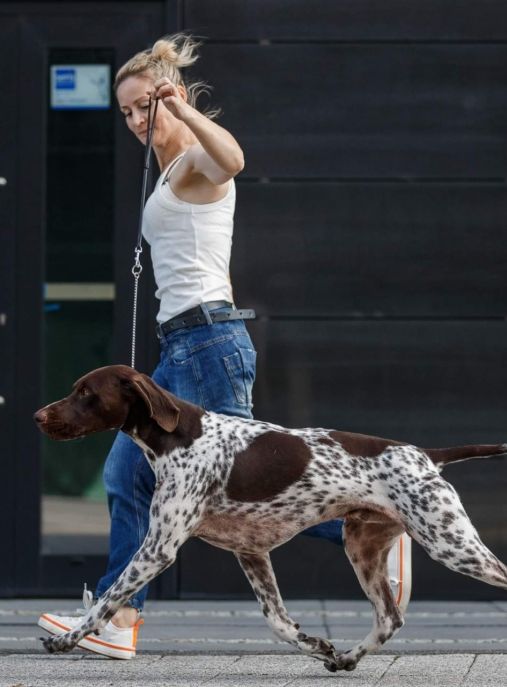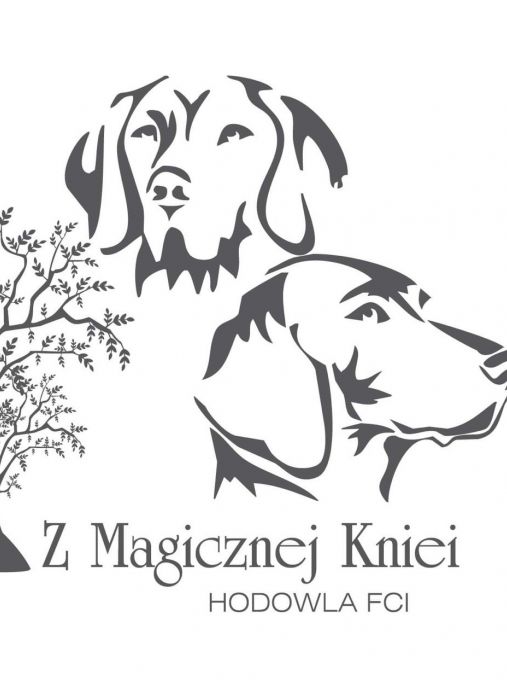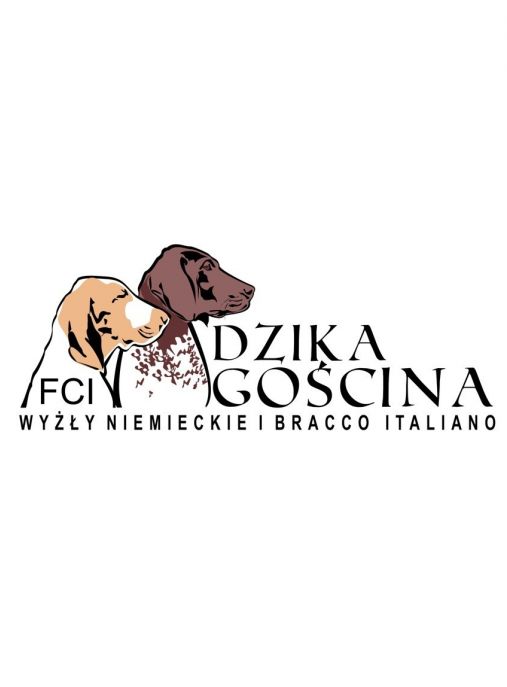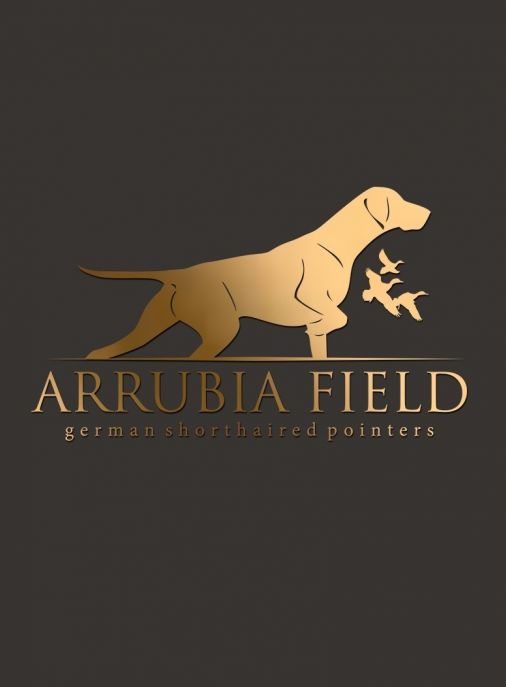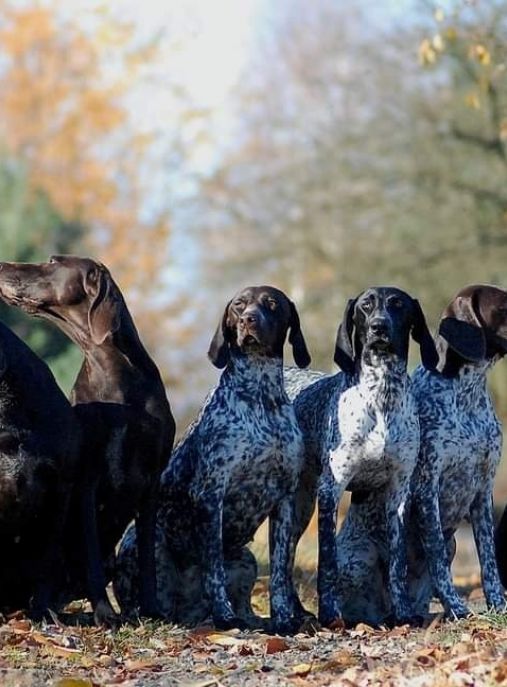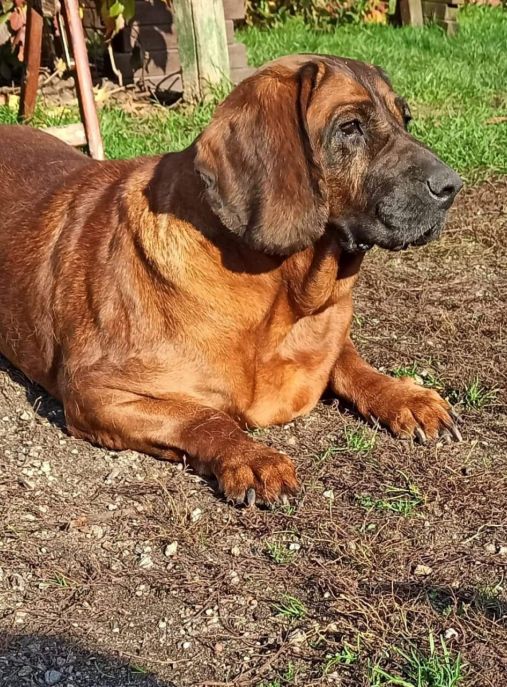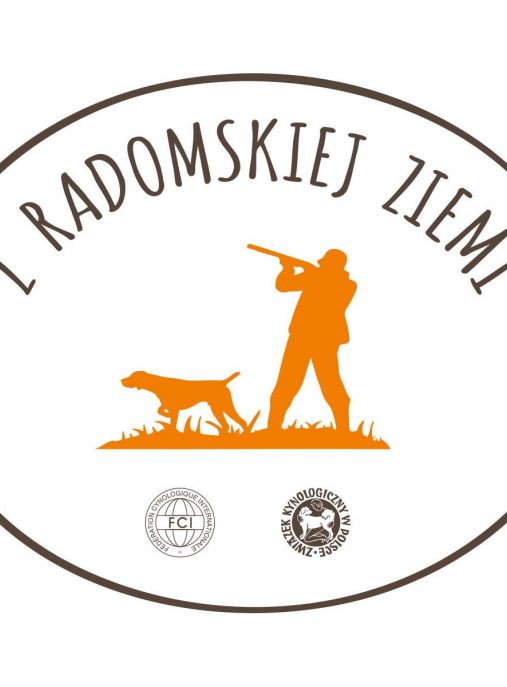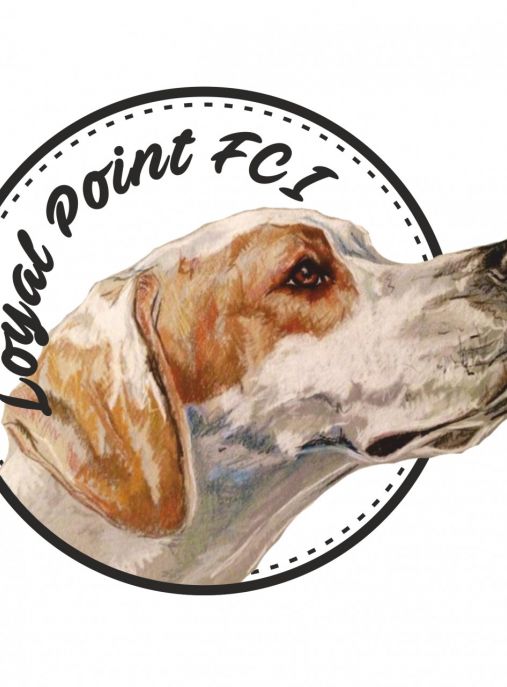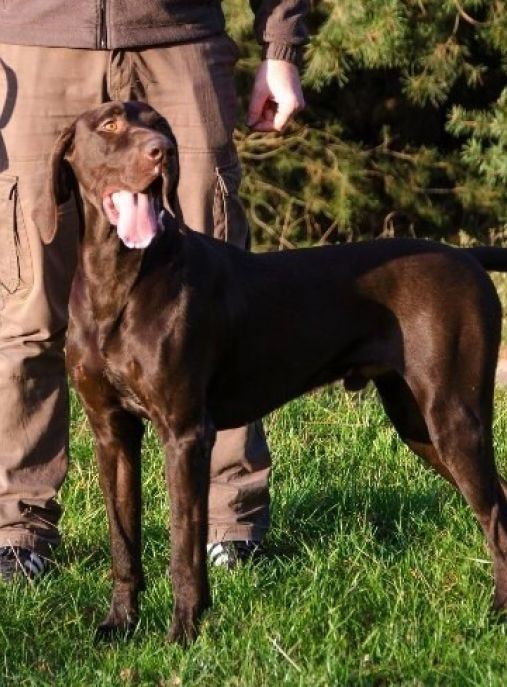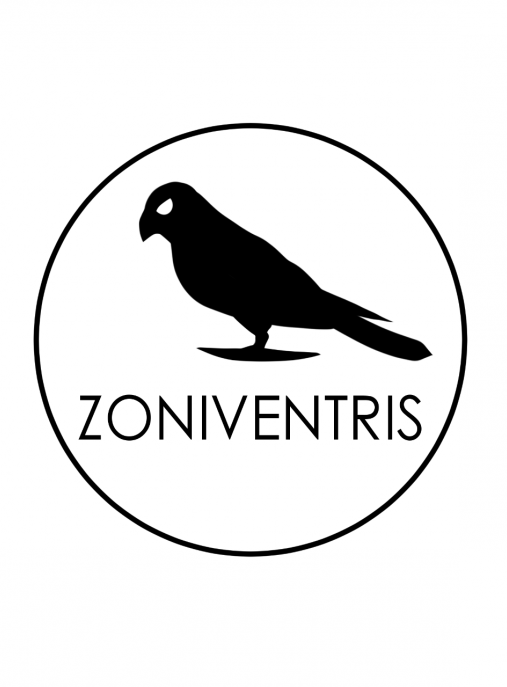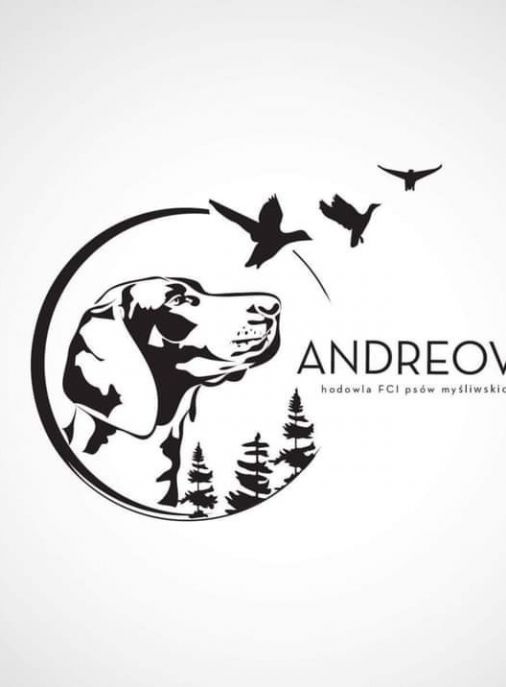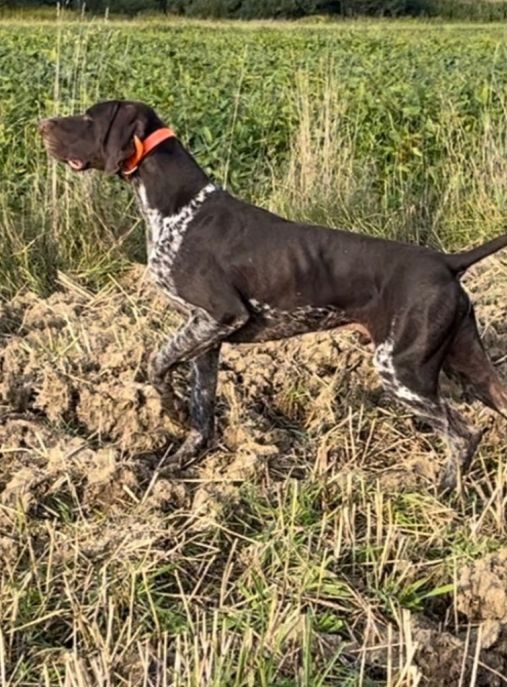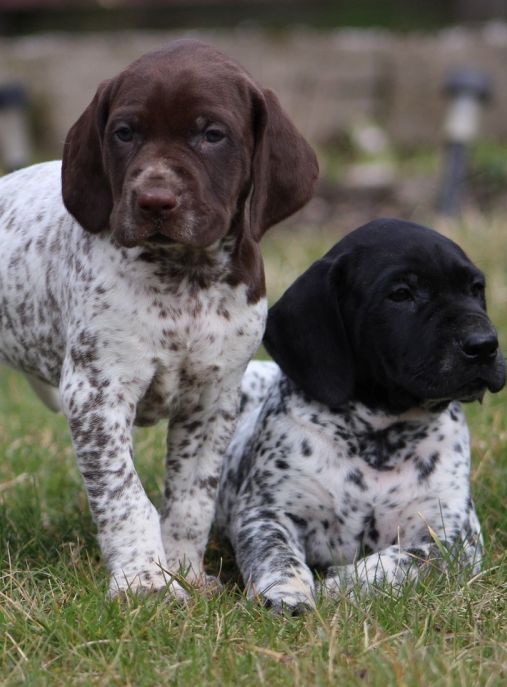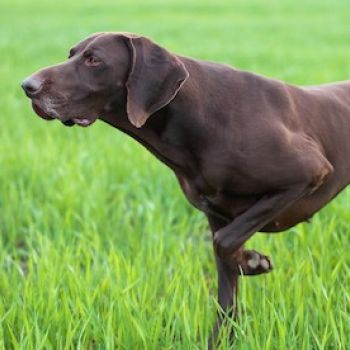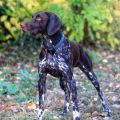The German Short-Haired Pointing Dog, also known as the Deutsch Kurzhaar, is a versatile and intelligent breed that excels in various activities such as hunting, tracking, and even as a family companion. With its distinctive appearance and exceptional skills, this breed has gained popularity not only in Germany but also worldwide.
Originating in Germany during the 19th century, the German Short-Haired Pointing Dog was developed by crossing various breeds, including the Spanish Pointer, Bloodhound, Foxhound, and English Pointer. The goal was to create a versatile hunting dog that could track, point, and retrieve game both on land and in water. The breed's development was primarily led by breeders who aimed to create a dog that possessed exceptional scenting abilities, intelligence, and a strong desire to work.
According to the FCI (Fédération Cynologique Internationale) typology, the German Short-Haired Pointing Dog belongs to Group 7: Pointing Dogs. Within this group, it falls under Section 1: Continental Pointing Dogs, and its breed number is 119. This classification highlights the breed's exceptional pointing and tracking abilities, which are essential for its primary purpose as a hunting dog.
German Short-Haired Pointing Dogs are highly versatile and can adapt to various hunting environments, making them suitable for different types of game. They are known for their exceptional scenting abilities, which allow them to track and locate game with precision. Additionally, their pointing instinct is highly developed, enabling them to freeze in a pointing position to indicate the presence of game to the hunter. Furthermore, they excel in retrieving both on land and in water, making them ideal for waterfowl hunting.
Apart from their hunting prowess, German Short-Haired Pointing Dogs also make excellent family companions. They are known for their friendly and affectionate nature, making them great with children and other pets. However, it's important to note that they have high energy levels and require regular exercise and mental stimulation to prevent boredom and destructive behavior.
In terms of physical characteristics, German Short-Haired Pointing Dogs are medium to large-sized dogs. Males typically stand between 23 to 25 inches (58 to 64 cm) at the shoulder, while females are slightly smaller, ranging from 21 to 23 inches (53 to 58 cm). The breed's weight ranges from 55 to 70 pounds (25 to 32 kg) for males and 45 to 60 pounds (20 to 27 kg) for females.
The breed's coat is short, dense, and water-repellent, providing protection in various weather conditions. The coat color can vary and includes combinations of liver, black, and white, with or without ticking. The distinctive head features a broad skull, a well-defined stop, and a long, strong muzzle. The eyes are medium-sized and can range in color from brown to amber, while the ears are set high and hang close to the head.
The average lifespan of a German Short-Haired Pointing Dog is around 12 to 14 years, which is relatively long for a medium to large-sized breed. However, like all dogs, they can be prone to certain health issues, including hip dysplasia, ear infections, and certain eye conditions. Regular veterinary check-ups, a balanced diet, and regular exercise can help maintain their overall health and well-being.
One interesting fact about German Short-Haired Pointing Dogs is their exceptional trainability. They are highly intelligent and eager to please, making them quick learners. This breed excels in various dog sports and activities, including obedience, agility, and tracking trials. Their versatility and willingness to work make them a favorite choice for many professional hunters and trainers.
In conclusion, the German Short-Haired Pointing Dog is a versatile and intelligent breed that excels in hunting, tracking, and various dog sports. With its exceptional scenting abilities, pointing instinct, and retrieving skills, it is highly valued by hunters. Additionally, its friendly and affectionate nature makes it a great family companion. Whether in the field or at home, the German Short-Haired Pointing Dog is a remarkable breed that continues to leave a lasting impression.
The German Short-Haired Pointing Dog, also known as the GSP, is a versatile and intelligent breed that excels in various activities such as hunting, tracking, and agility. With their distinctive appearance and exceptional character, GSPs have become popular companions for active individuals and families alike.
In terms of character, GSPs are known for their high energy levels, intelligence, and loyalty. They are incredibly active dogs that require plenty of exercise and mental stimulation to thrive. Regular walks, jogs, or play sessions are essential to keep them physically and mentally satisfied. Due to their hunting background, GSPs have a strong prey drive and an instinct to point and retrieve. This makes them excellent hunting partners, but it also means they may chase small animals if not properly trained and socialized.
GSPs are highly intelligent and eager to please, making them relatively easy to train. They are quick learners and excel in obedience training, agility, and other dog sports. However, their intelligence can also make them independent thinkers, so consistent and firm training methods are necessary to establish boundaries and prevent any unwanted behaviors. Positive reinforcement techniques, such as treats and praise, work best with this breed, as they respond well to rewards and positive feedback.
Socialization is crucial for GSPs from an early age. They are generally friendly and sociable dogs, but proper exposure to different people, animals, and environments is necessary to prevent any potential shyness or aggression. Early socialization helps them develop into well-rounded dogs that are comfortable in various situations.
GSPs are known for their affectionate and loyal nature towards their families. They thrive on human companionship and are happiest when they are included in family activities. They are not suited for a sedentary lifestyle or being left alone for long periods, as they may become bored and develop destructive behaviors. GSPs are best suited for active individuals or families who can provide them with plenty of exercise, mental stimulation, and quality time.
When it comes to raising a GSP puppy, it is essential to establish a consistent routine from the beginning. Crate training can be beneficial for housebreaking and providing a safe space for the puppy. Early obedience training and socialization should start as soon as the puppy is brought home. Consistency, patience, and positive reinforcement are key to raising a well-behaved and well-adjusted GSP.
In conclusion, German Short-Haired Pointing Dogs are intelligent, energetic, and loyal companions. They require an active lifestyle, plenty of mental stimulation, and consistent training to thrive. With proper socialization and training, GSPs can become excellent family pets, hunting partners, and competitors in various dog sports.
The German Short-Haired Pointing Dog (GSP) is a versatile and energetic breed known for its hunting abilities, intelligence, and loyalty. To ensure the well-being and happiness of your GSP, it is essential to provide them with proper care and attention. Here are some tips on how to care for dogs of this breed, including what to do and what not to do:
1. Exercise: GSPs are highly active dogs that require regular exercise to maintain their physical and mental health. Engage them in activities like running, swimming, and playing fetch. Aim for at least an hour of exercise daily to prevent boredom and destructive behavior.
2. Mental Stimulation: Along with physical exercise, GSPs need mental stimulation to prevent boredom. Provide them with puzzle toys, obedience training, and interactive games to keep their minds sharp. These dogs thrive when given tasks to accomplish.
3. Training and Socialization: GSPs are intelligent and eager to please, making them highly trainable. Start obedience training early to establish boundaries and teach basic commands. Additionally, socialize your GSP from a young age by exposing them to various people, animals, and environments to ensure they grow up to be well-rounded dogs.
4. Grooming: The GSP's short coat is low-maintenance and only requires occasional brushing to remove loose hair. However, they are prone to ear infections, so regularly check and clean their ears. Trim their nails regularly and brush their teeth to maintain good oral hygiene.
5. Diet and Nutrition: Provide your GSP with a balanced and nutritious diet to support their active lifestyle. Choose high-quality dog food that meets their specific needs, considering factors like age, weight, and activity level. Consult with a veterinarian to determine the appropriate portion sizes and feeding schedule.
6. Health Care: Regular veterinary check-ups are crucial to ensure your GSP's overall health. Vaccinations, parasite prevention, and dental care should be part of their routine. GSPs are prone to certain health issues like hip dysplasia, bloat, and allergies, so be vigilant for any signs of discomfort or illness.
7. Avoid Overexercising: While GSPs require ample exercise, avoid overexerting them, especially during their growth stages. Overexercising can lead to joint and bone problems. Adjust their exercise routine based on their age, physical condition, and any underlying health issues.
8. Avoid Boredom: GSPs are prone to destructive behavior when bored or under-stimulated. Avoid leaving them alone for extended periods, as they thrive on companionship. Provide them with interactive toys, rotate their playthings, and consider doggy daycare or a dog walker if you're away for long hours.
9. Avoid Harsh Training Methods: GSPs respond best to positive reinforcement training techniques. Avoid harsh punishments or physical corrections, as it can damage their trust and hinder their learning process. Use rewards, praise, and treats to motivate and reinforce good behavior.
10. Avoid Overfeeding: GSPs have a tendency to overeat, leading to weight gain and associated health problems. Follow the recommended portion sizes and avoid free-feeding. Monitor their weight regularly and adjust their diet and exercise accordingly.
Remember, every GSP is unique, and individual care requirements may vary. Understanding your dog's specific needs and providing them with love, attention, and proper care will ensure a happy and healthy life for your German Short-Haired Pointing Dog.
The German Short-Haired Pointing Dog, known for its versatility and athleticism, is a breed that exhibits a wide range of coat colors. However, the most common color seen in these dogs is liver, also known as liver roan or liver ticked. This coloration gives these dogs a distinctive and eye-catching appearance.
The liver color in German Short-Haired Pointing Dogs is a rich, deep shade of brown. It is often described as a dark chocolate or mahogany color. The coat is typically solid liver, meaning there are no other markings or patterns present. This uniform coloration gives the dog a sleek and elegant look.
The liver color is most prominent on the dog's body, including the back, sides, and chest. The coat is dense and short, providing protection and insulation for the dog in various weather conditions. The liver color extends to the head, ears, and muzzle, creating a harmonious and balanced appearance.
One of the distinguishing features of the liver color in German Short-Haired Pointing Dogs is the presence of ticking. Ticking refers to small flecks or spots of a lighter color scattered throughout the liver coat. These ticking spots can range in color from white to a lighter shade of liver. They add depth and texture to the overall appearance of the dog's coat.
In addition to the liver color and ticking, German Short-Haired Pointing Dogs may also have some white markings. These markings are usually found on the chest, paws, and tip of the tail. The white markings provide a striking contrast to the liver color, further enhancing the dog's overall appearance.
It is important to note that while liver is the most common color in German Short-Haired Pointing Dogs, they can also come in other colors such as black, black roan, or combinations of liver and white. However, the liver color remains the most prevalent and sought-after among enthusiasts and breeders.
Overall, the liver color in German Short-Haired Pointing Dogs is a beautiful and distinctive feature that sets them apart from other breeds. It adds to their regal and athletic appearance, making them a popular choice for both working and companion dogs. Whether in the field or at home, these dogs are sure to turn heads with their striking liver coat and ticking spots.
The German Short-Haired Pointing Dog (GSP) is a versatile and athletic breed known for its hunting abilities, intelligence, and loyalty. When it comes to their health, GSPs are generally considered a robust and healthy breed. However, like all dogs, they are prone to certain health conditions. In this text, we will explore the most common diseases found in GSPs and provide tips on how to care for their overall health.
One of the most prevalent health issues in German Short-Haired Pointing Dogs is hip dysplasia. This condition occurs when the hip joint doesn't develop properly, leading to discomfort, lameness, and arthritis. To minimize the risk of hip dysplasia, it is crucial to obtain a GSP puppy from a reputable breeder who performs hip evaluations on their breeding dogs. Additionally, maintaining a healthy weight, providing regular exercise, and avoiding excessive jumping or rough play during the puppy stage can help reduce the likelihood of developing this condition.
Another common health concern in GSPs is bloat, also known as gastric dilatation-volvulus (GDV). This is a life-threatening condition that occurs when the stomach fills with gas and twists on itself. GSPs are considered a deep-chested breed, which puts them at a higher risk for bloat. To prevent this condition, it is recommended to feed GSPs smaller, frequent meals rather than one large meal a day. Avoiding vigorous exercise immediately before or after meals and using elevated feeding bowls can also be beneficial.
GSPs are also prone to certain eye conditions, including progressive retinal atrophy (PRA) and cataracts. PRA is a degenerative disease that leads to vision loss and eventual blindness. Regular eye examinations by a veterinary ophthalmologist can help detect these conditions early on, allowing for appropriate management or treatment options. Cataracts, which cause clouding of the lens, may require surgical intervention if they significantly impact vision.
Additionally, GSPs can be susceptible to allergies, particularly food allergies and atopic dermatitis. If your GSP displays signs of itching, redness, or recurrent ear infections, it may be necessary to work with a veterinarian to identify and eliminate potential allergens from their diet or environment. Regular grooming, including ear cleaning and nail trimming, is also essential to maintain their skin and coat health.
To ensure the overall well-being of your German Short-Haired Pointing Dog, regular veterinary check-ups are vital. These visits allow for preventive care, such as vaccinations, parasite control, and dental examinations. GSPs are an active breed that thrives on exercise, so providing them with regular physical activity, mental stimulation, and socialization is crucial for their mental and physical health.
Proper nutrition is also essential for maintaining the health of GSPs. Feeding a high-quality, balanced diet that meets their specific nutritional needs is crucial. Consult with your veterinarian to determine the appropriate diet for your GSP based on their age, activity level, and any specific health considerations.
In conclusion, while German Short-Haired Pointing Dogs are generally healthy, it is important to be aware of the potential health issues that can affect this breed. Regular veterinary care, a balanced diet, exercise, and preventive measures can help ensure that your GSP lives a long, healthy, and happy life.
The German Short-Haired Pointing Dog is a versatile and active breed known for its athleticism and hunting abilities. To ensure their overall health and well-being, it is crucial to provide them with a balanced and nutritious diet. Proper nutrition plays a vital role in maintaining their energy levels, promoting a healthy coat, and supporting their overall growth and development.
When it comes to feeding a German Short-Haired Pointing Dog, it is essential to choose high-quality dog food that meets their specific nutritional needs. Look for a premium dog food brand that lists real meat as the primary ingredient, such as chicken, beef, or fish. Avoid dog foods that contain fillers, by-products, or artificial additives, as these can be detrimental to their health.
The diet of a German Short-Haired Pointing Dog should consist of a balanced mix of proteins, carbohydrates, healthy fats, vitamins, and minerals. Proteins are crucial for muscle development and repair, so ensure that their diet includes lean meats like chicken, turkey, or fish. Carbohydrates, such as whole grains and vegetables, provide the necessary energy for their active lifestyle.
Healthy fats, like omega-3 and omega-6 fatty acids, are essential for maintaining a shiny coat and supporting brain function. These can be found in fish oil, flaxseed, or canola oil. Additionally, including fruits and vegetables in their diet can provide essential vitamins and minerals, as well as fiber for proper digestion.
The feeding schedule for a German Short-Haired Pointing Dog should typically consist of two meals per day. Puppies may require more frequent feeding until they reach adulthood. Avoid free-feeding or leaving food out all day, as it can lead to overeating and weight gain.
It is crucial to monitor their weight and adjust their portion sizes accordingly. German Short-Haired Pointing Dogs are prone to obesity, which can lead to various health issues. Consult with your veterinarian to determine the appropriate portion sizes based on your dog's age, weight, and activity level.
In addition to a balanced diet, fresh water should always be available for your German Short-Haired Pointing Dog. Hydration is essential, especially during hot weather or after intense physical activity.
While providing a nutritious diet is essential, there are certain foods that should be avoided for the safety of your German Short-Haired Pointing Dog. Some common foods toxic to dogs include chocolate, grapes, raisins, onions, garlic, and caffeine. These can cause severe health issues, including kidney damage, anemia, and even death. Additionally, avoid feeding them fatty or spicy foods, as these can lead to digestive upset or pancreatitis.
Lastly, treats can be a part of your German Short-Haired Pointing Dog's diet, but they should be given in moderation. Opt for healthy, low-calorie treats made specifically for dogs, and avoid giving them table scraps or human food as treats. Excessive treats can lead to weight gain and nutritional imbalances.
In conclusion, providing a balanced and nutritious diet is essential for the overall health and well-being of a German Short-Haired Pointing Dog. Choose high-quality dog food, monitor portion sizes, and avoid foods that can be harmful to their health. By following these guidelines, you can ensure that your German Short-Haired Pointing Dog remains healthy, active, and happy for years to come.
